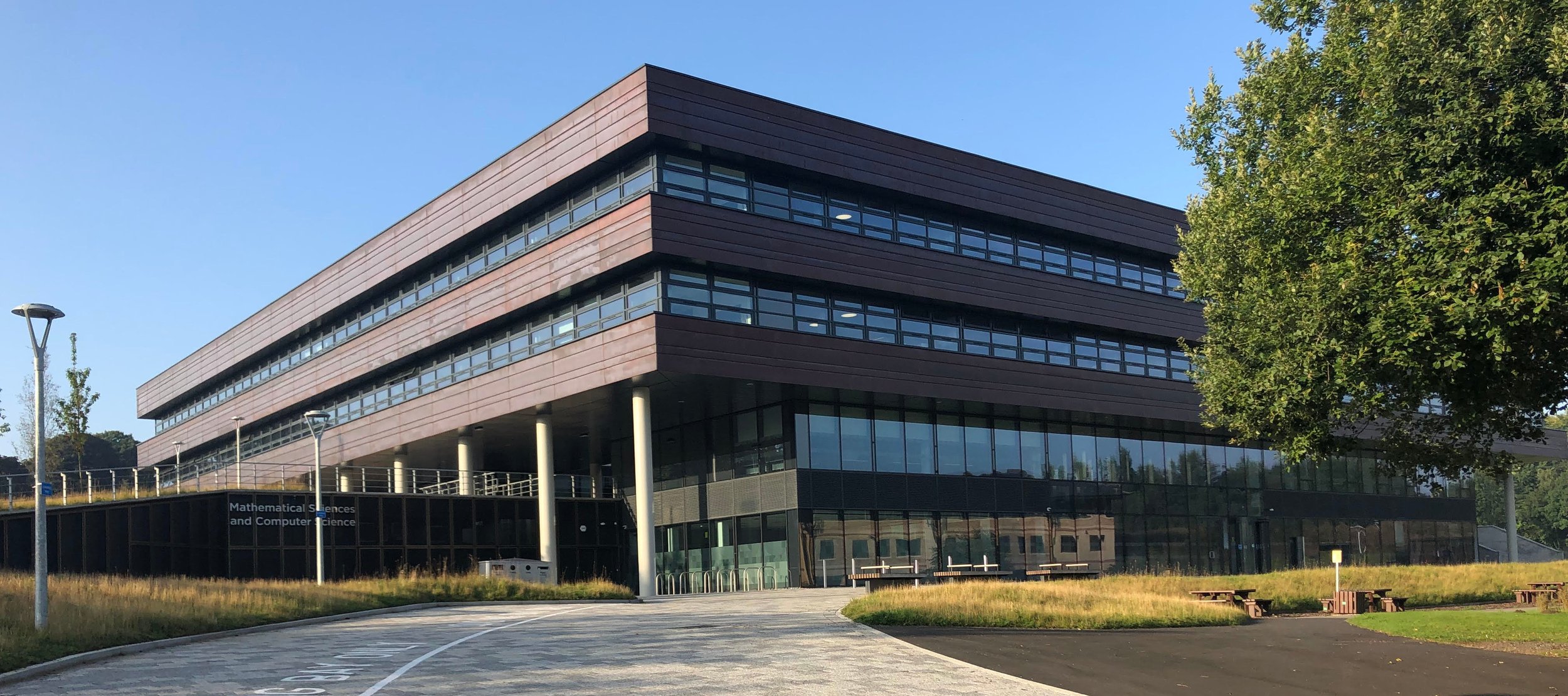Tropical Mathematics & its Applications 2024
Tropical Mathematics & its Applications
(Meeting of the LMS joint research network)
Date + Location
18-19 March, Durham University (MCS 2068).
Schedule + Speakers
Day 1:
before 13:30 - informal lunch in the department
13:30 to 14:20 - Yoav Len (St. Andrews)
14:30 to 15:20 - Rohini Ramadas (Warwick)
15:30 to 16:00 - coffee break
16:00 to 16:50 - Nick Early (MPI Leipzig)
17:00 to 18:00 - free time for discussions
18:00 - walk to informal dinner(s) in Durham city centre
Day 2:
10:00 to 10:50 - Diane Maclagan (Warwick)
11:00 to 11:50 - Yassine El Maazouz (Aachen)
12:00 to 13:30 - informal lunch at the botanical garden
13:35 to 13:50 - Sulaiman Alhussaini (Birmingham)
13:55 to 14:10 - Siao Chi Mok (Cambridge)
14:15 to 15:00 - walk to Durham train station
15:00 onwards - free time for discussions in the station pub
Registration
To register please send an email to yue.ren2@durham.ac.uk or b.smith9@lancaster.ac.uk. If you are interested in giving a contributed talk or if you are a UK-based PhD student requiring funding to support your travel, please let us know until February 12.
Titles + Abstracts
Sulaiman Alhussaini (Birmingham): The Application of Tropical Algebra in Public Key Cryptography
We will explore how the tropical semiring can be used to construct cryptographic protocols. We will also analyze the security of some proposed tropical protocols and identify their vulnerabilities, especially those related to the ultimate periodicity of tropical matrix powers and the solution of the tropical linear system Ax=b.
Nick Early (MPI Leipzig): Scattering amplitudes, moduli space tilings and their tropicalization
There is a remarkably compact formula in Quantum Field Theory, due to Cachazo, He and Yuan (CHY), which is an integral over the moduli space $M_{0,n}$ of n points on the projective line, localized to the solutions of the scattering equations. The integrands, known as Parke-Taylor factors, have singularities which are closely related to the face lattice of the $n-3$ dimensional associahedron, and express the Feynman rules for the color-ordered $n$-point biadjoint $\phi^3$ amplitude. By duality, $M_{0,n}$, or $X(2,n)$, has a twin moduli space $X(n-2,n)$ of $n$ generic points in $P^{n-3}$, leading to dual formula to the usual CHY formula for scattering amplitudes. Any duality begs for an explanation: what generalized notion of scattering amplitudes lie between these twin formulas, computed using integrals over moduli spaces $X(k,n)$ of points in projective space of arbitrary dimension? In this talk, I will explain how ideas from particle physics and combinatorial and tropical geometry reveal and complete the puzzle, and open many new doors for future investigation. Based on joint works with Cachazo and Zhang, and Pfister and Sturmfels.
Yoav Len (St Andrews): The geometry of Prym varieties
The talk will revolve around Prym varieties, a class of Abelian varieties that shows up when studying symmetries of curves and graphs. Pryms have deep connections with tangent lines of curves, spin structures, and torsion points of Jacobians. Via tropical geometry, problems concerning Pryms may be reduced to a variation of the chip-firing game on graphs. This leads to new results in the geometry of special algebraic curves and a generalization of Kirchhoff’s matrix-tree theorem.
Diane Maclagan (Warwick): Update on tropical schemes
A subscheme of tropical affine space is described by an ideal in the semiring of tropical polynomials satisfying certain matroidal condition. This generalises to subschemes of tropical toric varieties. In this talk I will give an overview of the current status of the program to better understand these objects, with a focus on recent progress and future challenges.
Yassine El Mazzouz (Aachen): Tropical invariants for binary quintics and reduction types of Picard curves
Similar to the j-invariant criterion for the reduction of elliptic curves, we express the reduction types of Picard curves in terms of tropical invariants associated to binary quintics. We also give a general framework for tropical invariants associated to group actions on arbitrary varieties. The problem of finding tropical invariants for binary forms fits in this general framework by mapping the space of binary forms to symmetrized versions of the Deligne–Mumford compactification of M_{0,n}.
Siao Chi Mok (Cambridge): Logarithmic Fulton-MacPherson configuration spaces
In 1994, Fulton and MacPherson constructed a compactification of the configuration space of points on a projective manifold. The compactification has excellent properties - it is smooth and projective with normal crossings boundary. As part of their foundational study, Fulton and MacPherson gave an explicit presentation of the cohomology ring of their spaces. In this talk, I will recall the construction of the Fulton--MacPherson spaces, and then explain the generalization of the construction to the simple normal crossings pair setting. Precisely, given a variety X and a normal crossings divisor D, I will explain how one can compactify the configuration space of n distinct points on X\D using logarithmic geometry. I will also mention some of the properties that this compactification satisfies. Time permitting, we will discuss some potential applications of this project.
Rohini Ramadas (Warwick): Thurston theory in complex dynamics: a tropical perspective
Topologically speaking, a morphism from CP^1 to itself is a branched covering from S^2 to itself. In the 1980s, William Thurston proved a theorem addressing the question: which branched coverings of S^2 are (suitably equivalent to) morphisms of CP^1? Thurston’s theorem is still central in complex and arithmetic dynamics. I will introduce Thurston’s theorem and a reinterpretation (due to Koch) in the language of algebraic geometry. Finally, I will give a tropical viewpoint.
Dinner Options
Akarsu (Turkish)
Bistro Italiano (Italian)
Rudy’s (Pizza)
Sense (Chinese)
Zapatista (Burritos)
Participants
Sulaiman Alhussaini (Birmingham)
Yueqi Cao (Imperial)
Oliver Daisey (Durham)
Nick Early (MPI Leipzig)
Alex Fink (Queen Mary)
Natalia Mayo Garcia (Warwick)
Jeff Giansiaracusa (Durham)
Ariff Jazlan Johan (Imperial)
Josh Kimberly (Birmingham)
Yoav Len (St Andrews)
Paul Lezeau (UCL)
Linxuan Li (Queen Mary)
Zihong Lin (Cambridge)
Yassine El Maazouz (Aachen)
Diane Maclagan (Warwick)
Siao Chi Mok (Cambridge)
Navid Nabijou (Queen Mary)
Rohini Ramadas (Warwick)
Felipe Rincon (Queen Mary)
Yue Ren (Durham)
Rob Silversmith (Warwick)
Ben Smith (Lancaster)
Roan Talbut (Imperial)
Hannah Tillmann-Morris (Imperial)
Hao Zhang (Glasgow)
This even is partially funded by the LMS (Ref 92103) and the UKRI (MR/S034463/1).

